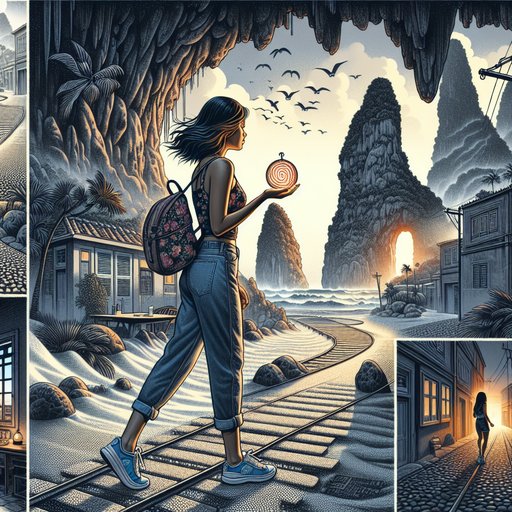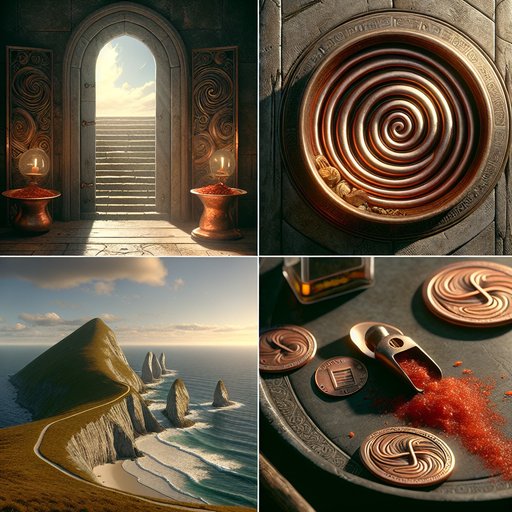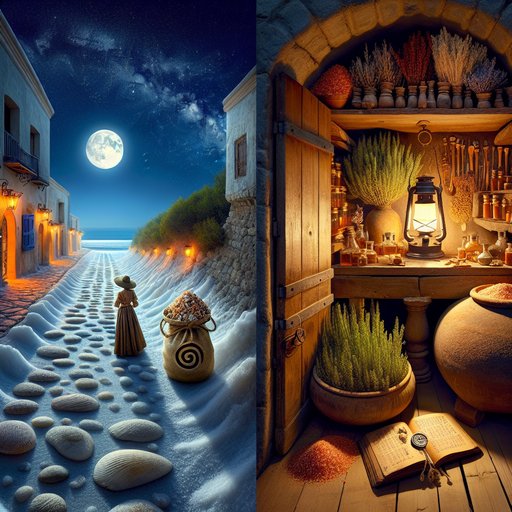CHAPTER 3 - Salt Songs, Glitter Nights, and a Wind That Hums

Barbra Dender, stalled in her Socotra investigation after chasing a shadow and collecting a mute copper token etched with a spiral and three bars, hits a dead end. The perfumer’s guarded family and local caravan men refuse to explain the cryptic mentions of a “salt road” and a “singing cave.” Frustrated, she decides to relax: she dresses up in her Louboutins and a glittering jacket to attend an impromptu music night near the harbor, where an old song hints at her symbols. Later, seeking solitude, she trades her pumps for her blue and white Asics and walks alone into a wind-cut wadi, where she discovers a narrow cleft that literally sings, its salt-crusted ridges aligned like the three bars on her token. Inside, a mummified swirl of resin and a faint humming resonance suggest the token may respond to specific tones, revealing “the salt road” as a path of acoustic landmarks rather than a drawn map. Returning to town at dusk, she finds the resin spiral on her windowsill now marked with three tiny cuts, a wordless acknowledgment from her watchers. Following a trail of red resin dust through the alley, she comes to a door carved with a spiral, poised between invitation and trap, and the chapter ends on a cliffhanger.
By morning, the adrenaline of the alley had curdled into a thin ache of frustration behind Barbra’s eyes. The copper token lay on the table, crusted with salt, its spiral and three bars refusing to speak a language she could learn. She had tried overlaying the ledger scrap again, matching tear to horizon, but the edges still refused to align. The wind off the sea picked up, rattling the shutters of her rented room above the perfumer’s shop in Hadibo, shaking loose a scent of orange blossom and resin.
Raised by her grandparents, she knew how to sit with the silence of a dead end, but sitting did not soothe her impatience today. Downstairs, the perfumer’s family offered warmth without answers, a solid wall of kindness that bent but would not break. The grandfather pressed dates into her palm and pointed to a shelf of oils as if a fragrance might dissolve questions. The middle-aged son scanned her token and shrugged as if it were a trinket sold to tourists, though his eyes flicked to the spiral and then away.
Caravan men in the market fell suddenly busy when she mentioned the “salt road,” their smiles becoming masks, their hands flicking invisible dust from their clothes. Integrity kept her from pushing harder, but every polite no carried the weight of a locked door. Back upstairs, the resin spiral someone had left on her windowsill the previous night sat exactly where she’d found it, its glossy coil catching the light. She set the copper token beside it and watched the sea-reflected shimmer walk across both, waiting for an answer that didn’t come.
The island felt like it was holding its breath, the dragon’s blood plateaus beyond town a low red line under a milky sky. Barbra blew out a long exhale and looked at herself in the small mirror, freckles scattered across her nose and cheeks like a constellation she had never learned to love. She hardly ever wore makeup and didn’t now, trusting the stubborn truth of her face even when she didn’t believe in its beauty. She decided that if the mystery wouldn’t open, she would pry open her evening instead.
She slid into her tight jeans, a black tank top, and chose the silver-glitter jacket from her collection, the one that threw back stray rays like chips of starlight. From the bottom of her wardrobe she lifted a pair of Louboutins pumps, the red soles pristine—she was always careful of them, carrying pride in the way they transformed her walk. She slipped them on with the measured reverence of someone cradling a small treasure, flexing her calves taut from long walks. The copper token went into her pocket anyway, because even when she tried to step away, the island came along.
The harbor courtyard filled with a haze of lamp smoke and laughter, and someone plucked a tune on a battered oud that loosened the tightness around her lungs. A woman from the perfumer’s family—she thought the niece was named Salma—waved her over and pressed a glass of pomegranate tea into her hand, crimson as spilled resin. Barbra laughed at a story she only half understood, catching the rhythm of gestures and eyes when the words went too fast. She danced a little, careful not to scuff her heels, moving with that lightness that came from remembering she could be alone and still be alive to the world.
She fell briefly, foolishly in love with the image of a smile under the lamplight, and then let it drift away like smoke. Mid-song, the oud player shifted to an older melody, low and deliberate, and the courtyard stilled as if everyone had remembered the same person at once. The lyrics, laced with salt and wind, told of caravans walking a road that rose and fell like breath, stopping where caves sang when storms passed. Barbra felt the tiny shock of recognition crawl across her skin at the words “three lines for the wind, a spiral for the keeper.” When the song ended, she edged closer, asking what the lines and spirals meant, but the player only smiled and looked toward the perfumer’s shop.
An old woman near the door shook her head and murmured that some caves sing men mad and some sing them home. The edge of town breathed cool as Barbra slipped away from the music, the alley’s shadows mottled by moonlight. Sand tugged at the stiletto tips of her Louboutins, and she winced, lifting them off with a sigh and hanging them by their straps over her fingers. She padded onto the beach barefoot, the shock of cold sand up her arches grounding her in the most literal way.
The receding tide left pale plates of crystalline crust, and in two of them the desiccated lines lay in parallel like three small ribs. She laughed at herself, a little feral rattle in her throat, aware of how easily the mind makes maps from mirrors. In the morning, she sought her medicine: distance, wind, and a horizon uncluttered by voices. She dressed in the uniform that never failed her—tight jeans, her blue and white Asics sneakers, a white tank top—and shrugged on her floral denim jacket.
The city’s perfume thinned as she followed a goat path inland to a wadi, the air picking up salt with every step until it tasted like regret on her tongue. Dragon’s blood trees stood like frozen bursts of fireworks on the ridges, their shadows stippling the dust. The loneliness that had once been a wound when she was four, then a habit, now bloomed into competence as she narrowed her attention to the angle of stone and the direction of wind. She found the cleft by listening, not looking.
At first it was no more than the smallest thread of sound, a hum the ear questions until the chest answers. The slit in the limestone was barely wide enough for her shoulders, a seam glowing white where salt had crusted, its edges marked by the delicate scratches of goats squeezing through. She slid sideways into it, scraping her jacket, the rock cool and damp, her breath measuring space in four-beat phrases. Inside, where the light dulled to chalk, the floor shimmered with a fine powder like frost, and across one wall three ridges of salt stood proud like deliberate bars.
Barbra pulled the copper token from her pocket and, feeling foolish and thrilled, held it up to the ridges. The hum deepened as a gust threaded the cleft, and the token gave a faint answering vibration, like a silent bell struck very far away. She moved it closer to the bars, and the resonance seemed to align with the wind in steps, three soft pulses that stood the hairs on her arms. On the ground, tucked against a stone, something curled like a small fossil—a hardened twist of dragon’s blood resin, a swirl echoing the token’s spiral.
Her throat tightened in the best and worst way; the pieces weren’t talking yet, but they had stopped pretending they’d never met. She didn’t pocket the resin—the island had taught her restraint—but she touched it, letting the rough shell catch the oils from her skin. A memory surfaced of her grandparents teaching her to listen to wheat fields, to hear weather shift through the stems, and she laughed at how training for one landscape readied her for another. The “salt road,” she realized, might never have been a drawn path at all; it could be a chain of acoustics, clefts calibrated by ridges to sing only when wind moved a certain way.
The three bars etched into everything could be notches for tone, a signature in sound. She traced the air, moved the token through it again, and felt that tiny hum return like a nod. Climbing out, she squinted into the noon brightness, the island suddenly a map not of lines but of echoes. She marked the place on her ledger scrap with a small dot, then hesitated, adding nothing else in case someone else’s hands ever held it.
On the way back, she searched for other clefts by ear, stopping when a hollow gust deepened into a note like a distant conch. Twice she heard only wind, and once, a throat-scratch of sound that had no grace to it at all. Nothing else sang like the first one, and that made her believe in it more. By dusk, her room smelled of citrus again, and the window caught the day’s last gold.
The resin spiral on her sill now bore three tiny cuts across it, delicate and deliberate, hair-thin as lashes. She hadn’t made them, and no breeze could have, and her chest filled with something equal parts dread and invitation. She set the copper token beside the marked spiral and watched the two cast their odd little shadows. The island was speaking in symbols, and now it was speaking back to her specifically.
A dusty streak of red tracked the alley below, barely there, as if someone had sifted resin grains from their hand as they walked. Barbra slid into her Asics and leather jacket, tucked the token into her pocket, and slipped down the stairs, leaving her glitter jacket for another night. The perfumer’s shop door clicked softly behind her, and the street swallowed the sound. The resin trail led toward the older quarter where the walls leaned inward like a secret, turning the wind into whispers.
It ended at a wooden door banded in iron, a spiral carved so faintly above the latch that it nearly vanished when she blinked. She raised her hand and paused, palm hovering just above the handle, every lesson of restraint and every bite of urgency warring in her bones. On the other side, a scrape of chair legs and a murmur, then sudden quiet, as if her presence had turned sound to stone. The copper token felt warmer against her thigh, or maybe her blood was rising to meet it.
If she pushed, would they let her cross from hinted song to spoken story, or had she followed the salt road straight into a trap?


































































